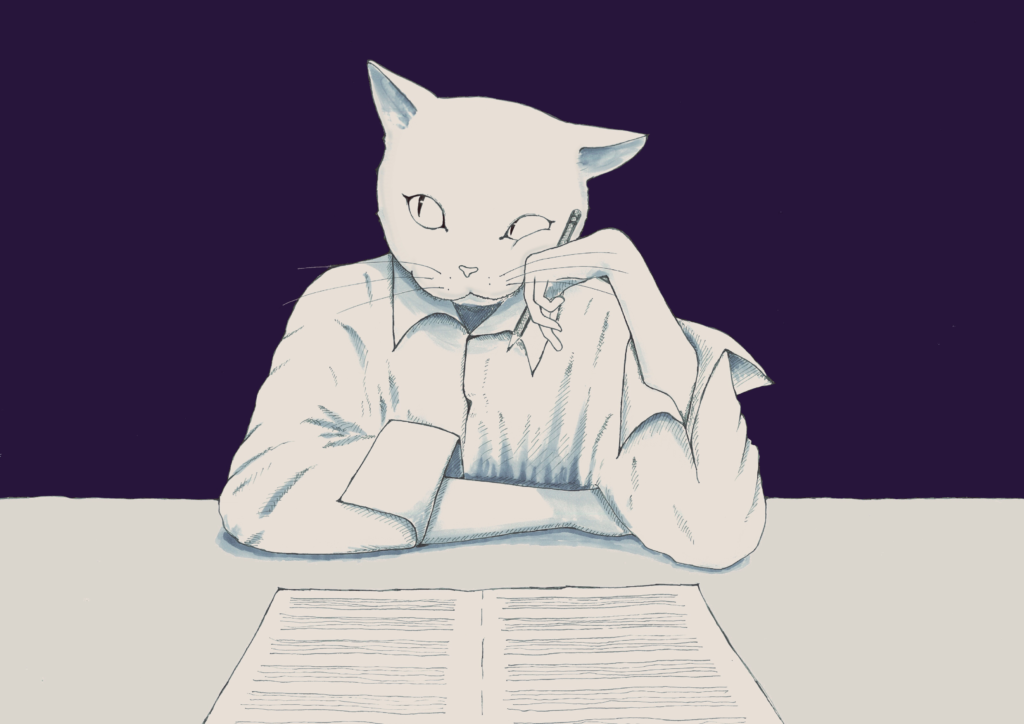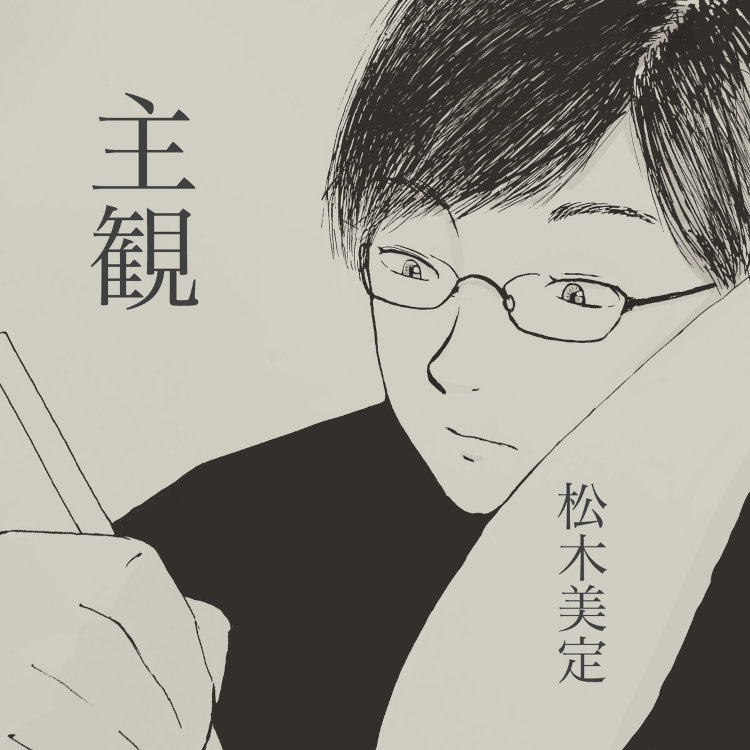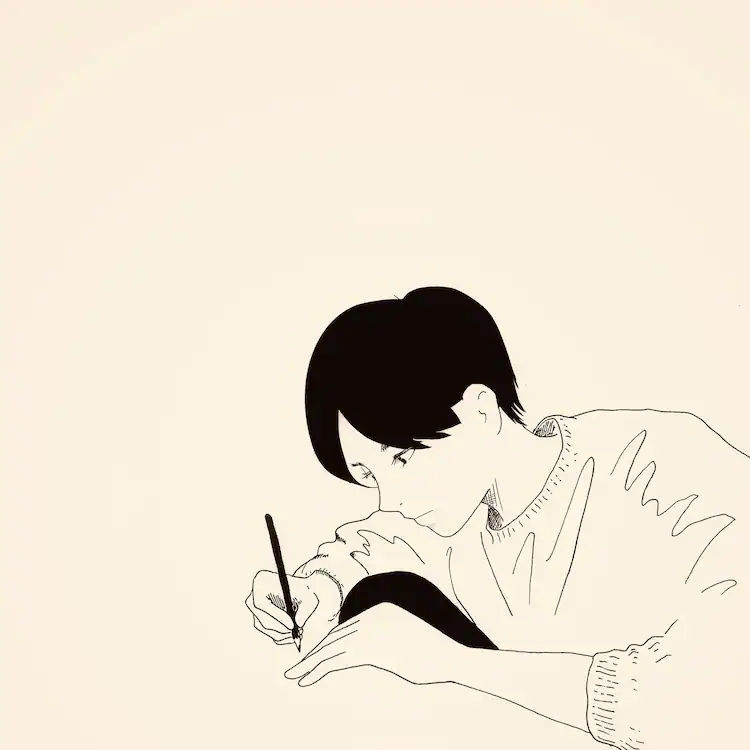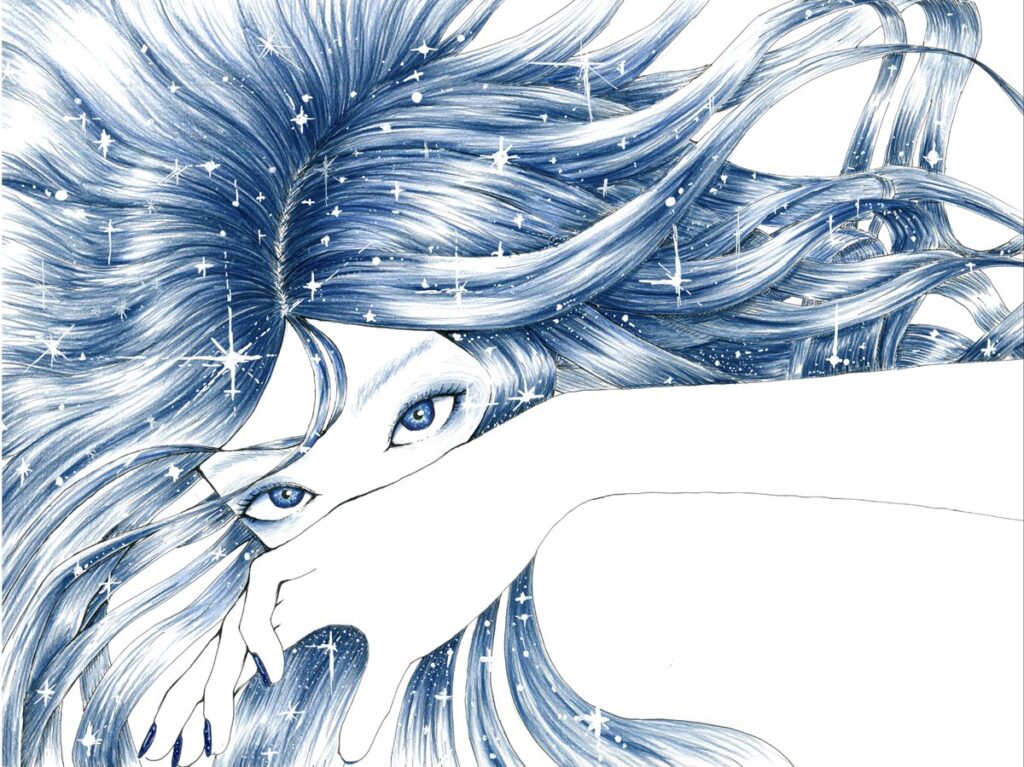Who is Bitei Matsuki? Since I learned of his existence online in 2020, I’ve been fascinated by this enigmatic artist’s music. I first found out about him through his double single, “Strollin’ with Sincerity/Out of focus.” The songs are modeled after hard bop and have fluid rhythms and chords; the vocals and melodies are poignant, and the lyrics are beautiful. Just by listening to these songs, I could sense the extraordinary talent of this musician that goes by the name of Matsuki. Further, to my surprise, I discovered that he makes his songs by himself. This person truly knows no boundaries.
I asked Matsuki for an interview because he released his new EP with three songs called Luminescence de Tsuranuite. Thankfully, I finally got the chance to talk to him. When I started our Zoom call, I heard his voice from across the screen, but there was only a still image in front of me. That’s how my conversation with Matsuki’s illustration of a cat began.
Bitei Matsuki’s early memories of music
—Why have you chosen to use a cat as your persona?
Bitei Matsuki (Matsuki): In part, because I always had a pet cat growing up, I love them. It might sound weird for me to say this, but cats have a moody personality and maintain a certain distance from people, and I can relate to that (laughs).
—How about the other characters you’ve drawn in the past? Are they fictional people, not a projection of yourself?
Matsuki: You could say the people in my artwork are imaginary, but when I draw, I put a mirror in front of myself and go like, “If my posture is like so and so, then this is how the contours look like.” Because I do that as I draw, it’s not a stretch to say every character is referencing me, in a sense.
—I see. What kind of music did you grow up listening to? Could you talk about how your taste in music changed until you became a musician?
Matsuki: I first started listening to the music my parents played in the car. I especially remember how my mother would play the Carpenters. My father used to play many Japanese folksongs in his car. But back then, I preferred the foreign music my mother put on.
—It sounds like the Carpenters inspired your music.
Matsuki: They influenced me a whole lot. Because I had casually been listening to them since I was born until I graduated from elementary school, it’s like their music is ingrained in me. But back then, I wasn’t that interested in music. I had more fun playing in the mountains (laughs).
—I heard you were raised in the mountains of Shizuoka.
Matsuki: Yes. I had the most fun being in nature when I was small, but I was forced to join an afterschool club in middle school. So, I joined the school’s brass band.
—Did you play any instruments before that point?
Matsuki: It was for such a short time, but I had some piano lessons in elementary school. But I just had no interest in music, so I would always think like, “I want to go home already and check out the stag beetle I caught yesterday.” The teacher was scary, and I quit so quickly. I didn’t gain too much from that.
—Did joining the brass band club trigger your interest in music?
Matsuki: No, not really. I didn’t want to join any club. But the school had this rule where you had to join one unless you had a proper reason not to. And the only options were baseball or brass band, so I thought it was better to pick the brass band (laughs).
—When did you start listening to music on your own accord?
Matsuki: Once I got into high school. My friend recommended Queen to me, and then I actively started listening to music.
—What was it about Queen that appealed to you?
Matsuki: Probably like the Carpenters; the melody. That friend who recommended Queen to me liked jazz, and we all started a jazz band in high school after our afterschool activities. From that point onwards, I started loving jazz more and more. I played the trumpet in the brass band, so I played some sessions as a trumpet player in my university’s jazz society.
Being enchanted by jazz and hard bop; awakening to songwriting in university
—When did you start writing songs?
Matsuki: I think it was around the end of 2012. When an older student at university played Bud Powell’s “Oblivion,” I felt this shock that I had never felt before. I thought, “I didn’t know a song as beautiful as this existed in the world.” I began songwriting because I wanted to try writing a song like that.
—In what way did “Oblivion” resonate with you?
Matsuki: The disparity between the melody and chords. The melody of “Oblivion” is quite simple, as he presses the keys down for a while per bar. The melody is so beautiful, and the chords playing behind it are so fresh. It was something I had never experienced before.
—You mainly played the trumpet in the jazz society, yes? You started taking songwriting seriously thanks to Bud Powell, so does that mean you started taking on the piano at the same time?
Matsuki: Yes, I simultaneously started songwriting and practicing playing the piano. I wondered if I could be a pianist like Bud Powell, but ultimately, I could only achieve playing piano accompaniments.
—Is it safe to say the complex chords in your songs come from Bud Powell?
Matsuki: As I began listening to different types of jazz, I had a phase where I exclusively [listened to jazz] and stayed away from pop music. I was like, “I only accept jazz!” (laughs). I imitated many songs I discovered through Bud, studied the theory [behind them], and reharmonized (a technique to replace the original chords) them. As a result, I feel like that informed my music.
—What kind of jazz did you pursue?
Matsuki: After I started listening to Bud and before I began my career as Matsuki, I had studied songs by iconic hard bop musicians. I wanted to become the modern version of Horace Silver, so I made hard bop-like songs and added my touches.
—You reference verses used by Horace Silver in “Strollin’ with Sincerity.”
Matsuki: Yes. The melody’s good, so I couldn’t give it up, but I also didn’t want to be like, “I’m going to reharmonize this.” But I wanted to make a song that would strike a chord in the listener’s heart. I made “Strollin’ with Sincerity” by searching for that balance.
An encounter with pop music, and before Bitei Matsuki as a musician was born
—You were immersed in jazz, so at what point did you become interested in pop music again?
Matsuki: A younger student from the jazz society recommended Lamp’s “Hiyayaka na Jokei.” It was such a good song, and I felt shocked like when I first heard Bud Powell. I thought, “I didn’t know the world of pop music was this amazing.” Suddenly, my interest in pop began to surge, but I didn’t want to switch to pop music. If anything, I wondered if I could study Lamp’s song and utilize it in jazz. As I started discovering other musicians after Lamp, I developed an affinity and a particular kind of envy towards said musicians (laughs). This feeling of, “I want to make pop songs using the essence of hard bop, which I’ve cultivated” emerged.
—The first song you made is “Shigotops,” which you released in January 2019 on SoundCloud. Compared to the songs you released after that, “Shigotops” sounds different. It’s as though you used cliches in pop songs on purpose.
Matsuki: That was on my mind. When I tried creating a pop song, it was difficult. I listened to various popular songs at the time and tried to make something similar to pop music. The melody and drums of “Shigotops” are super J-pop. However, the chords in the chorus are hard bop-like.
—Which songs did you reference upon trying to create a current pop song?
Matsuki: I listened to Sakanaction’s “Shintakarajima” and stuff. I wanted to reference that and complete a pop song.
—In a way, “Shigotops” was for practice, and the combination of pop and hard bop started manifesting after “Strollin’ with Sincerity”?
Matsuki: Exactly.
A new EP that extends beyond “pop meets hard bop”
――新作EPの表題曲「ルミネッセンスで貫いて」は、まさにそのポップスmeetsハード・バップ路線を踏襲しつつ、ミュージカル音楽的な展開に松木さんの新境地を感じました。この曲はどのようにして生まれたのでしょうか?
—The title song, “Luminescence de Tsuranuite” follows the “pop meets hard bop” route while also having a musical element. I felt like this was new territory for you. How did this song come about?
Matsuki: Upon creating this EP, there was a period where I couldn’t make a song that would be the centerpiece. Then, I watched an anime called Land of the Lustrous. It’s a CGI anime based on the shojo manga series of the same name; everything from the background was so sparkly. I watched that just when I was feeling down from the pandemic, so I wanted to make a bright and romantic song. I bought the manga and worked on creating the artwork while looking at the book. I then came up with the melody by looking at the artwork. I wanted to use a romantic title to a corny extent. I researched the effects of the reflection of gemstones (the Japanese word for a gem is 宝石, read as hoseki, and is in the original title of Land of the Lustrous) and came across luminescence. And I liked it.
—How did you come up with the character in the cover art?
Matsuki: There are different types of luminescence. The light made by fireflies and jellyfish is called bioluminescence. When I learned about that, I thought about drawing a new race that combines jellyfish and gems. That’s the image I had for the artwork.
—The harpsichords in the second song, “Amai Ame no Buto” are bold, and the Brazilian-like rhythm feels akin to Lamp.
Matsuki: When I was making this EP, I looked back on all my songwriting notebooks and found this song at the beginning of my first notebook. Meaning, I made this song around 2013, but it felt fresh for me. I believed it was a song I could write because of the times. So, I thought it was a good idea to include this song as a sort of self-introduction. I changed the original swing sound to a bossa nova like-rhythm and then added the lyrics afterward.
—You tweeted that you have a hard time writing the lyrics down. What do you keep in mind when you write them?
Matsuki: This can be applied to every song I’ve made so far: basically, I write all the lyrics for myself. It’s like, “If my words could encourage the listener, then that’s cool too.” The same could be said with “Amai Ame no Buto.” When I was alone for a long time during the pandemic, I fell a bit ill. I love spending time alone, but I understood that isolating myself too much wasn’t good. I tried translating that into the lyrics (laughs).
—Do you mean that making music has a self-care factor to it?
Matsuki: Yes, that’s right.
—The third song, “Kohan no Fune” is also an elegant pop song indicative of your style.
Matsuki: For a while, I uploaded “practice” songs onto SoundCloud in 2019. I wrote “Kohan no Fune” around then. I had been practicing playing the guitar then, so I tried making melodies with it. Because I had been making songs with my trumpet and piano, I had formed some habits. I made that song wanting to get rid of that. It was tough, and personally, it was an experimental thing to do. However, I believe I made a decent melody, surprisingly.
—The fact that you create such an intricate band ensemble sound on your computer is a testament to your ability as an artist. What do you think about making music on your computer? That is, do you view it as a tool to reproduce a “band” sound on your own, or is there something even better about it? I would love to know.
Matsuki: I started making music on my computer because I didn’t have anyone to make music with as a band. But the more I study it, the more fun I have because I can control everything by myself. Part of me wants to make the listener go, “A band’s performing this, right?” However, I also want to form a band one day. I want to hear ideas or opinions that I can’t bring about on my own. When I have time, I’d like to ask someone to play the guitar or drums for one of the demos I’m working on right now. I think [recording music] as a band and on the computer are both appealing.
—How about the vocals? The range of your melodies is wide, so I assume the level of vocals you want from yourself must be high, naturally.
Matsuki: I always struggle regarding that. When I make songs, I think, “This time, I’m going to make a song that matches my ability.” But once the melody’s finished, it never goes that way (laughs). I’ve never had vocal training, so I do feel limited. I always sing by figuring out what kind of tone and nuance would match the song.
—Are you interested in providing your songs to other singers?
Matsuki: I’d like to try it one day. Of course, I want someone else to sing a song I wrote, and I also want to continue singing. I don’t know what the future holds, but I hope I could produce music fully.
Bitei Matsuki
Born in Shizuoka prefecture in 1993, Bitei Matsuki started teaching himself piano and songwriting at 20. He studied songs by Horace Silver and others, imitated them, and began composing hard bop-style songs for fun. Around spring 2018, he started listening to excellent Japanese music after being suggested to do so by his friends. He realized the appeal of such music and wanted to make his own. At the end of November 2018, inspired by a producer friend, Matsuki took up producing music on his computer. At the same time, he kickstarted his career as Bitei Matsuki. He posted his first pop song, “Shigotops” onto SoundCloud in January 2019. Using Logic Pro X, he produces, performs the instruments, and sings every song. Further, all of the cover art is done by him. As such, he’s a multifaceted artist. In February, November, and December 2020, he released digital singles and continues to be active in music. Matsuki released a three-song EP titled Luminescence de Tsuranuite on August 31st, 2021.
Twitter:@matsukibitei
Translation Lena Grace Suda





